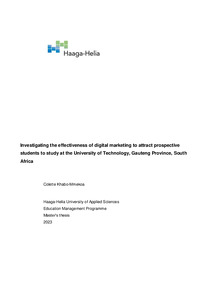Investigating the effectiveness of digital marketing to attract prospective students to study at the University of Technology, Gauteng Province, South Africa
Khabo-Mmekoa, Colette (2023)
Khabo-Mmekoa, Colette
2023
All rights reserved. This publication is copyrighted. You may download, display and print it for Your own personal use. Commercial use is prohibited.
Julkaisun pysyvä osoite on
https://urn.fi/URN:NBN:fi:amk-2023112431508
https://urn.fi/URN:NBN:fi:amk-2023112431508
Tiivistelmä
Tertiary education demand is on the rise globally as a result of more knowledge-based and innovation-driven economies. Universities worldwide work to attract prospective students, widen their networks, improve their standing and finances, and promote cross-faculty interdisciplinary re-search. Marketing for higher education is required to offer a different service to customers who can afford it. In other words, education provides people with choices. Based on how the education has been advertised, students may leave their home nations and visit another country because they have considered the education beneficial.
The aim of the study was to investigate the effectiveness of digital marketing in attracting prospective students to study at the University of Technology, Gauteng Province, South Africa, with objectives to (i) investigate the different digital platforms used to attract prospective students; (ii) assess the most effective digital platform used; (iii) determine the impact of digital technology on the application of prospective students; and (iv) compare the accessibility of the digital platform in rural and urban areas.
A quantitative study was used where a census in the form of a survey was sent to all first-year students registered for the 2023 academic year in various programs across all campuses of the University of Technology. Closed questionnaires were sent through the survey’s uniform resource locator (URL), and students accessed it through their personal and registered UoT4life emails. The link was accompanied by a cover page, an information leaflet, and an informed consent form. Participation in the study was voluntary and confidential. Respondents could withdraw at any time without consequences. All ethical requirements and considerations were observed.
Data was analysed using the Statistical Package for Social Sciences (SPSS) version 27 and presented in charts, graphs, and tables. The outcome of the study revealed that the digital platform used, which is Facebook, had a positive influence in recruiting the students and covered both rural and urban potential students.
The aim of the study was to investigate the effectiveness of digital marketing in attracting prospective students to study at the University of Technology, Gauteng Province, South Africa, with objectives to (i) investigate the different digital platforms used to attract prospective students; (ii) assess the most effective digital platform used; (iii) determine the impact of digital technology on the application of prospective students; and (iv) compare the accessibility of the digital platform in rural and urban areas.
A quantitative study was used where a census in the form of a survey was sent to all first-year students registered for the 2023 academic year in various programs across all campuses of the University of Technology. Closed questionnaires were sent through the survey’s uniform resource locator (URL), and students accessed it through their personal and registered UoT4life emails. The link was accompanied by a cover page, an information leaflet, and an informed consent form. Participation in the study was voluntary and confidential. Respondents could withdraw at any time without consequences. All ethical requirements and considerations were observed.
Data was analysed using the Statistical Package for Social Sciences (SPSS) version 27 and presented in charts, graphs, and tables. The outcome of the study revealed that the digital platform used, which is Facebook, had a positive influence in recruiting the students and covered both rural and urban potential students.
